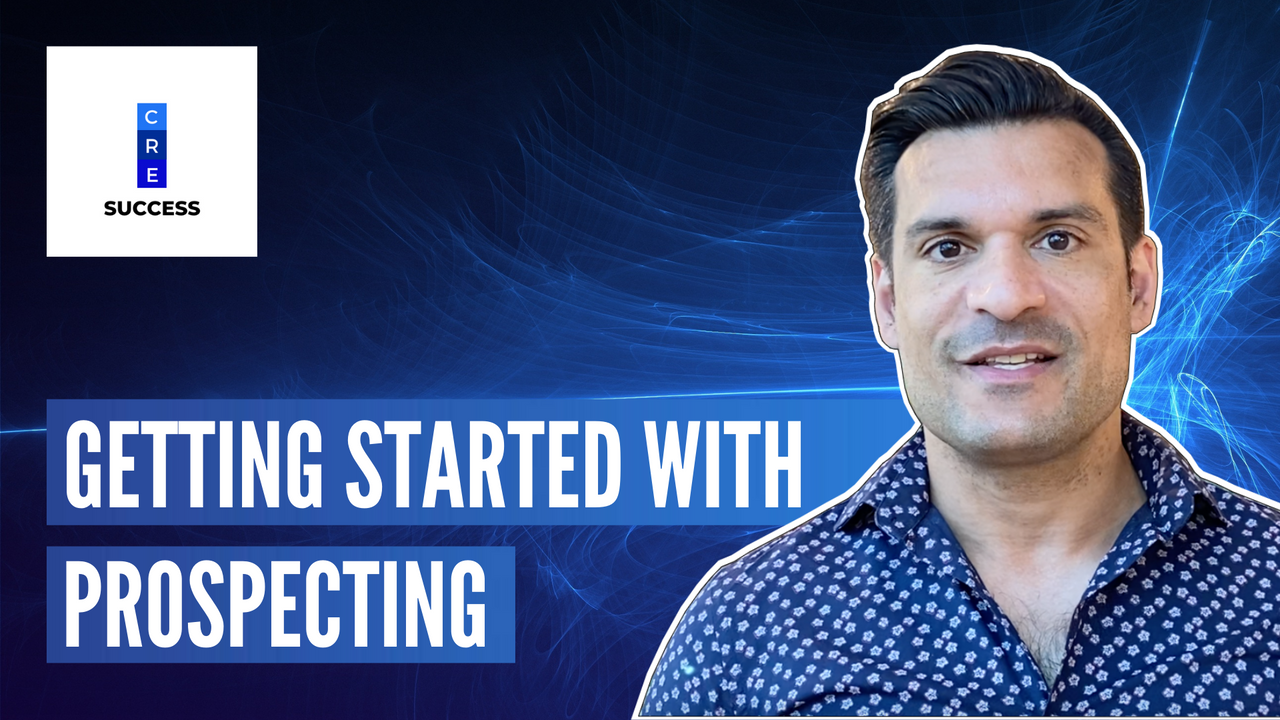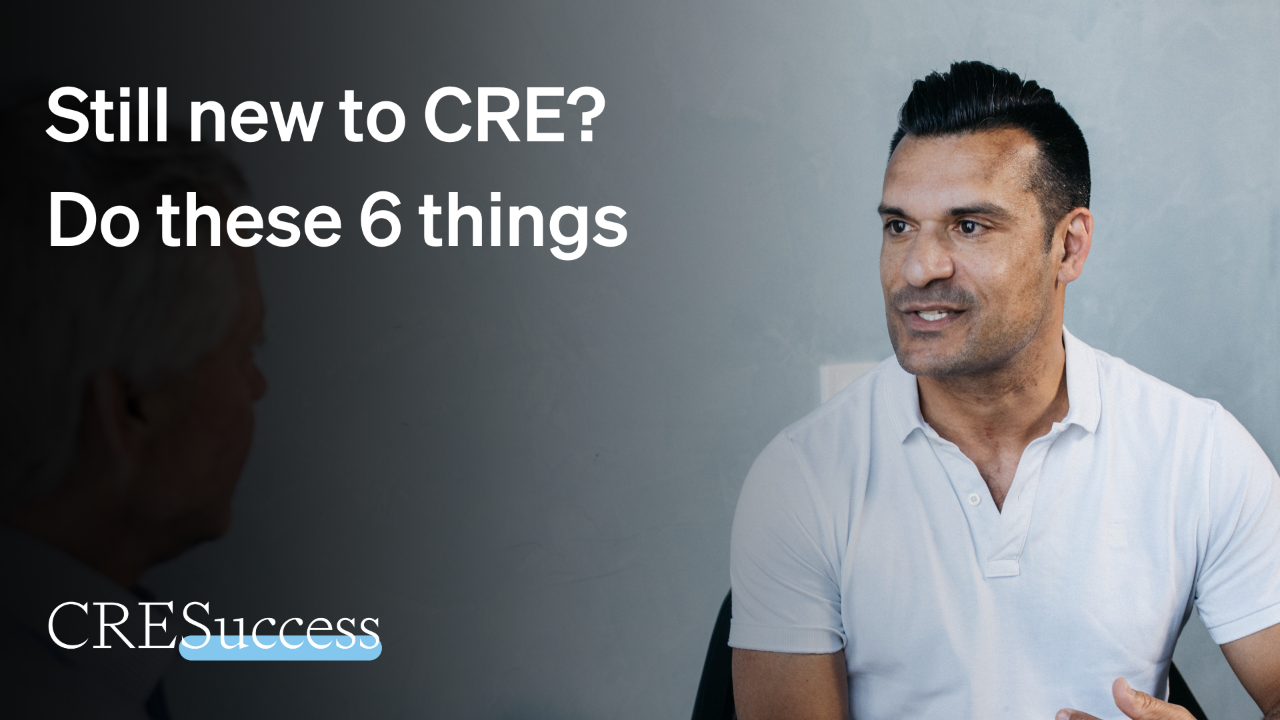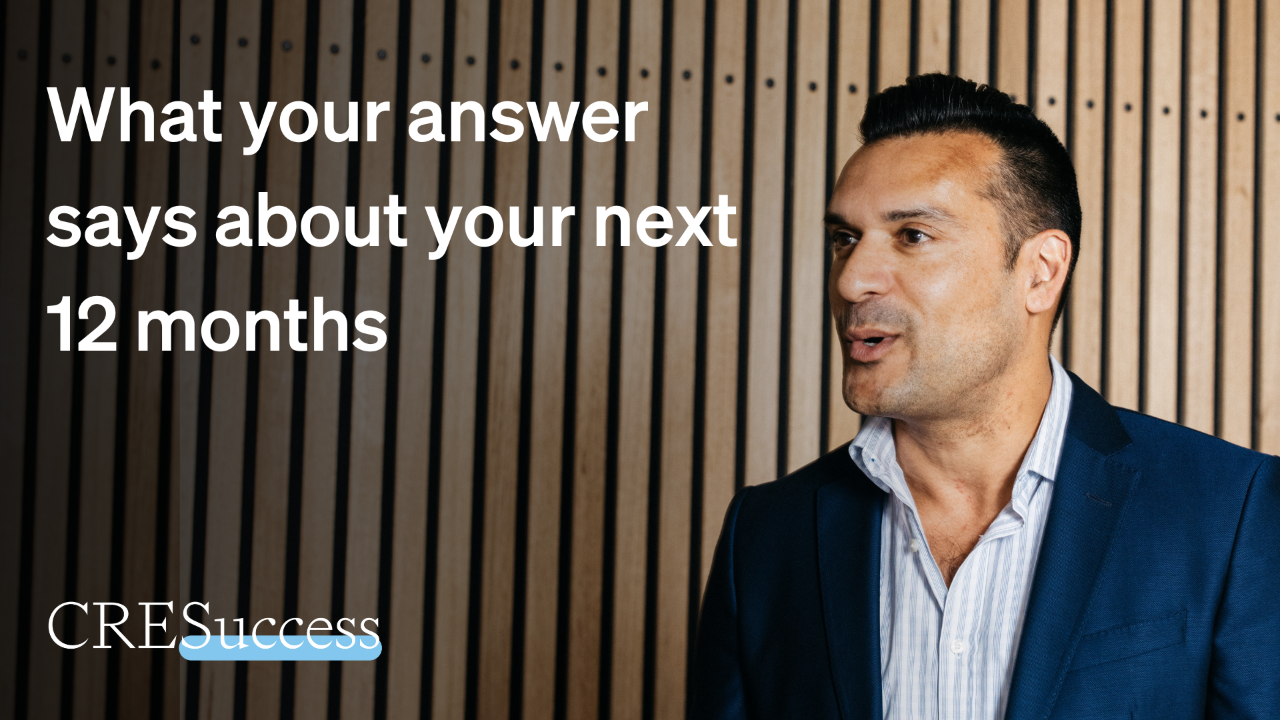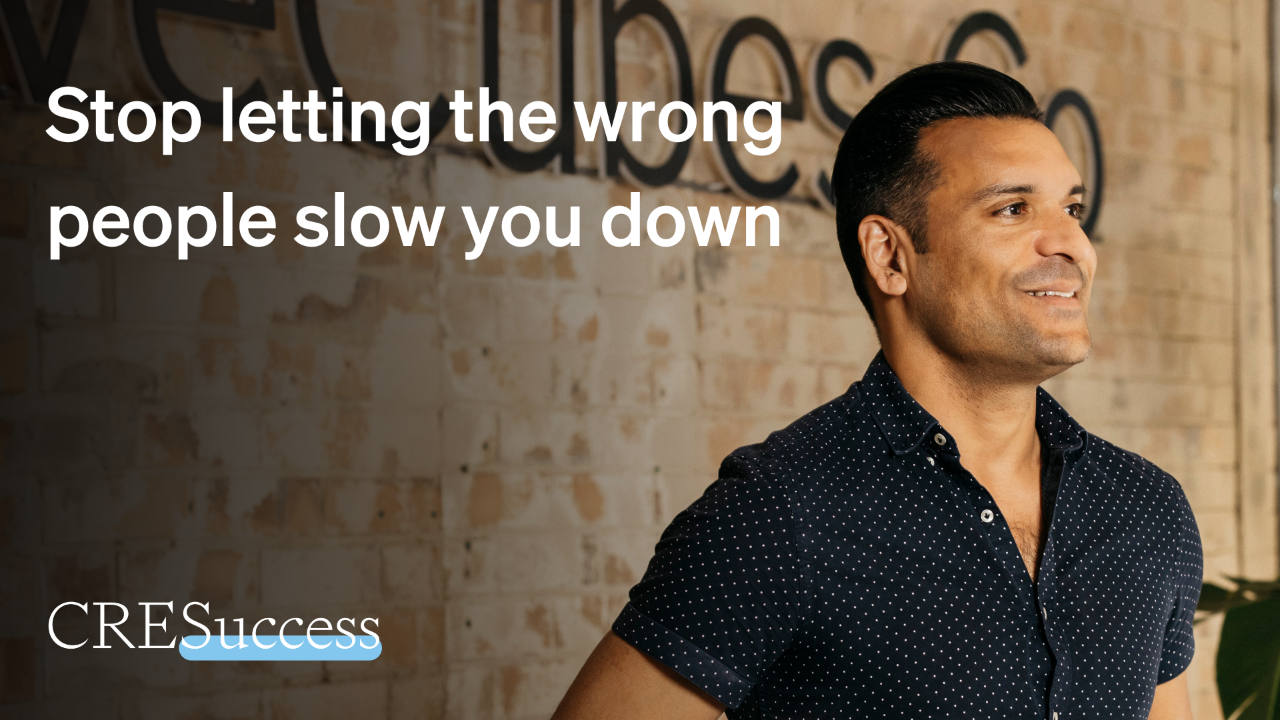Getting started with prospecting in commercial real estate
Nov 18, 2021
One of the most common hurdles when it comes to gaining momentum with prospecting in commercial real estate is: “I don’t know where to start”.
I get it; there are so many things you could do, that you can end up not knowing just what it is you should be doing.
Here are five ways you can get started with finding new clients – these ideas will help you stop procrastinating when it's time to start prospecting!
- Start conversations with people you already have a business relationship with – it's low pressure if you already know them.
- Start conversations with people you have any relationship with – your goal should be to learn some insights about their industry that you can use with other prospects.
- Target prospects you can be referred to and set up warm calls – you'll be far more motivated to make warm calls than cold calls. Get some context from the person who refers you.
- Contact prospects who are similar to the people in points 1 and 2 – you'll have good context to start more relevant conversations with them after speaking to similar people you know.
- Approach prospects that are your ideal future client – define the desirable attributes a future client should have and get to work on building a relationship with those people (even if it’s just sending them a LinkedIn request in the first instance).
One thing to remember when prospecting is that it is not about making a sale at this stage.
It’s about generating leads and starting conversations with them.
It’s about building some momentum.
The time for ‘selling’ comes later on in the process.
For the full details of how these simple but effective ideas work, check out episode 62 of CRE Success: The Podcast.
Episode transcript:
Do you do more procrastinating than prospecting?
You're not alone. So, let's talk about ways that you can get started and do more prospecting that will help you raise your performance.
Hello, and welcome to episode 62 of the show. My name is Darren Krakowiak.
I equip commercial real estate professionals with proven client attraction and retention systems, so they can save time earn more and be top performance in their market.
If this is your first time catching this content, welcome. And if you're a regular consumer of the show, well, thank you so much for returning.
This episode is brought to you by Re-Leased, a cloud based commercial property management platform which centralizes portfolio data, automates workflows and provides real time reporting for landlords and property managers.
Before we get into talking about prospecting, if you haven't yet registered for the Path to Success, I want to quickly invite you to do that.
It's a live and free virtual keynote happening in just one week from now. Make sure you grab your free ticket at cresuccess.co/path
We'll be talking about prospecting in this special event, but also about a range of skills that you need to master as you progress on the path to success.
I'll help you understand the skills that you should be mastering at various stages of your career.
And you'll also be able to identify where you are now and how you'll know when you've advanced to the next stage and also arrived at your final destination.
The path to success in commercial real estate, grab your ticket by going to cresuccess.co/path
Well, the idea for today's episode comes from partly myself, right?
I find myself when I should be contacting new prospective clients and doing something else and not focusing on the activity, I will listen back to this episode to remind me of some of these ideas.
But also, it came from somebody who subscribes to my emails, who contacted me a couple of months ago to let me know that they were moving to a new job.
And the new job was one where they would be required to find their own clients.
And their previous role wasn't one where they were in a revenue generating role.
And they asked me for some ideas on where they should get started with prospecting, because they just didn't know where to get started.
And I thought, "Well, what a great idea for a podcast episode because I think a lot of people feel like that", not only when you do move into a new role, or you move into a new market, but just every single day, where do I get started with prospecting.
So, that's where the idea or the inspiration for today's episode comes from if you don't know where to start with prospecting, or you find yourself procrastinating when you should be prospecting.
And if you are one of these people who is relatively early in your career, one thing I want you to know, as we go through some of these ideas’ is don't feel like you need to be aggressively prospecting at the very early stages.
Yes, I do want you to be out there speaking to people. But the idea of aggressively prospecting sort of running before you've learned how to walk may not be the best idea because you might not be ready to run yet.
So, what I would recommend that you are doing at this stage is just focus on starting conversations, and really growing your sphere of influence.
Now prospecting, of course, is not about closing deals, it's all about opening up a conversation getting you to the next step.
So, adopting that mindset can help you at any time with prospecting because it takes some pressure off the conversation rather than thinking, "Oh my goodness, I've got to make sure that this next call leads to revenue or I'm going to not be able to feed my family."
But if you think more about, "Well, I hope that I've got an opportunity to speak to this person again", then that's probably a better frame of mind to be in when you're prospecting than putting a lot of pressure on yourself.
So, with that being said, let's talk about some places that you may want to start with prospecting.
And, first place I would start would be people who you have some business relationship with.
Now, even if it was in a different context, so they weren't necessarily a client of yours, but if you have some relationship with them, and there's the possibility that the services you provide would be something that they may need in the future.
Well, I would start to have some conversation with them because you've already got the relationship and possibly you've already got some deposits in the relationship bank.
So, now's a great time for you to take a withdrawal out of the bank, by having a meeting with them, giving them a call, letting them know that you're in a new role and saying that you'd like to come and have a conversation with them.
And that will get your confidence up as well, because they're less likely to decline you for a beating, because you've already got the relationship.
So that would be the first place I would start.
The next place that I would start would be maybe people that I haven't done business with before, but it certainly I've got a business relationship with.
And I would be having a similar conversation with them, letting them know what I'm doing.
But even if I didn't think that they were a prospective client, I'd still be looking to hear from them about what they would have as recommendations for me to be focused on.
And instead of seeing them as opportunities for new business, you can see them as opportunities for information.
And that will help you have more context for the next group of people who I would recommend that you contact. And that is people who are similar to the first two groups of people.
Because once you've started to have some conversations with people who you already have a relationship with, the next step is to sort of move out of the shallow end of the pool and move a little bit more into the waist deep water, and to start to contact people that you don't know.
Now, that will be easier to do if you contact people who you don't know, but you've had conversations with people who are similar to them.
Now the reason why it will be easier as because you'll have more context about the types of things that they might be interested in talking to you about.
Now, I don't mean that you should be trading in any secrets that you've learned through the people that you already have a relationship with when you speak to these people.
But certainly, you'll get some understanding of what's important to that industry or people who are in that position.
And you'll be able to refer to that information to make the conversations that you have more relevant and resonate more with this new group of people that you do go and speak to.
The next group of people who I would be looking to speak to would be people who can be easily referred to.
So, calling up someone that you don't know is a lot more challenging and daunting than calling up someone who you've had a warm introduction to.
In fact, I might even do the warm introduction people before I reached out to the people who are similar to the people who I already knew, just because I've got a warm introduction.
In fact, you can have a conversation with them, which is more relevant and likely to resonate based on the person who referred you in might give you some information or some context, or you could do some research.
You could connect with them on LinkedIn, you could see what they post, you could do some research on their industry, or do some research on them.
And make sure that not only are you having a warm introduction, but your conversations likely to go somewhere because you've got some relevant information and something to have a conversation with them about.
Now, the other group of people who I would talk to when I want to get started with prospecting is the type of people who I want to do business with, right?
So, I've got this thing I've learned about five-star clients. I learned this from a guy called Taki More.
And he talks about five-star clients, it's just about defining five characteristics of your ideal client, and then looking for clients that have those characteristics. Pretty easy concept, right?
And when you know what they are, you'll be more likely to see them because your reticular activating system will be on the lookout for them.
So, define who they are, whether it's in terms of size, in terms of sector, in terms of geography. All the different factors that are important for you that are attractive for you to do business with.
Once you know who they are, then start to target them and to know as much as you can about them again before you contact them.
But if you desire to contact them, then that's a good group of people to contact.
So, when I came back to Melbourne in 2019, I'd spent nearly 12 years working and living overseas.
And I had to get started with prospecting and it was hard to know where to start, like, "Here I am in this city I haven't lived in for 12 years. Where do I start?"
And some places where I looked were, if I'd done business with the company in career, I thought well, there's a reason for me to contact them in Melbourne.
Also, people who are new in Melbourne, I contacted them and asked them, "Well, what is it that you're expecting from service providers who are doing what I'm doing? I'd love to know, what is it that's important to you?"
So, these are some ways that you can leverage existing relationships or reasons that you would have to call someone.
I think it's all about having a relevant reason to call someone to contact them, to have a conversation with them.
It's something that will go somewhere as opposed to just calling randomly.
So, these are the things that I would do to get started with prospecting.
I think the most important thing with prospecting, of course is just to get started, and to not procrastinate and to get the monkey off your back and to have those conversations.
Because once you start having conversations, that will create momentum, and it will become less scary to have more conversations in the future.
So, you can use the deep end pool analogy that I use before or you could use your running and jogging and marathons, right?
Like at first you just go for a short run and get into it. And then you might start increasing communism going further and even going for bigger fish to fry to use another analogy.
So, instead of thinking, "I don't know where to start", go through your contacts list.
Think about who it is that you feel comfortable to contact, who you've been dealing with in your day to day before.
Start having conversations with them, start having conversations with people who are like them, start looking for people who can be easily referred to and start looking also to make contact with people who you want to talk to, who are your definition of an attractive prospect or a five-star client in the future.
There's some ways that you can stop procrastinating and start prospecting.
Like I said, most important thing is to begin and B is for begin in the The A to Z of Commercial Real Estate Prospecting.
And I've got another 25 ideas on prospecting in that document. If you want to grab that free document, cresuccess.co/abc, it's The A to Z of Commercial Real Estate Prospecting.
And it will have a number of ways that will motivate you to not only get started with prospecting, but to elevate your prospecting game, and give you more ways to do it.
So, you don't get bored with prospecting the same way because prospecting I think is one of those parts of the job, which not everyone loves, but we all know that we really need to do it.
But if you can get better at it, and you can find more ways to do it, then it's going to be something that you're more motivated to do, and hopefully that you'll start to enjoy.
Well, thank you for sticking around to the end of today's episode. I appreciate you listening. I will speak to you soon.








